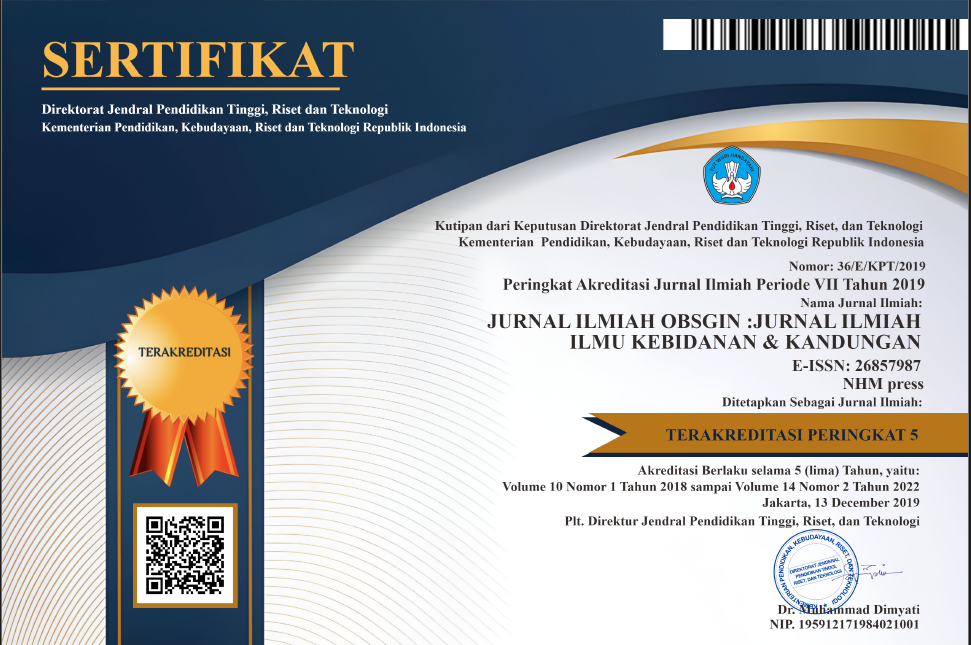Pengaruh Kecemasan Ibu Hamil terhadap Peminatan Vaksinasi Covid-19 di Puskesmas Kunir
Abstract
An increase in the anxiety of pregnant women of the COVID-19 is due to the lack of knowledge of pregnant women about COVID-19 and how to prevent it. Anxiety experienced can reduce the immunity of pregnant women so that they can be more susceptible to infection. The purpose was to determine the effect of pregnant women's anxiety on the specialization of covid 19 vaccination at the Kunir Health Center. This research is quantitative research with cross sectional approach. The sample was pregnant women who had ANC visits and had not been vaccinated against COVID-19 at the Kunir Health Center as many as 45 respondents using the total sampling technique with the sperman rho test. The results showed that most of the respondents had a mild level of anxiety as many as 55.6% and an interest in the Covid 19 vaccine in the moderate interest category as many as 42.2%. From the Spearman's rho test was found that the p value <0.05( p = 0.000), which means that there is an influence of pregnant women's anxiety on the interest in Covid 19 vaccination at the Kunir Health Center. It is recommended that midwives always behave educatingly while in the community so that they can be used as role models in implementing health protocols and using vaccines.
References
Angesti, E. P. W. (2020). Hubungan Tingkat Pengetahuan Ibu Hamil Trimester 3 dengan Kesiapan Menghadapi Persalinan di Masa Pandemi Covid-19 di Puskesmas. 42(1), 1–10.
Antoun, L., Taweel, N. El, Ahmed, I., Patni, S., & Honest, H. (2020). Maternal COVID-19 infection, clinical characteristics, pregnancy, and neonatal outcome: A prospective cohort study. European Journal of Obstetrics and Gynecology and Reproductive Biology, 252, 559–562. https://doi.org/10.1016/j.ejogrb.2020.07.008
Dewi, R., Widowati, R., & Indrayani, T. (2020). Pengetahuan dan Sikap Ibu Hamil Trimester III terhadap Pencegahan Covid-19. Health Information : Jurnal Penelitian, 12(2), 131–141. https://doi.org/10.36990/hijp.v12i2.196
Dunkel Schetter, C., & Tanner, L. (2012). Anxiety, depression and stress in pregnancy: Implications for mothers, children, research, and practice. Current Opinion in Psychiatry, 25(2), 141–148. https://doi.org/10.1097/YCO.0b013e3283503680
Ifa Nurhasanah. (2020). Faktor yang mempengaruhi kecemasan pada ibu hamil saat pandemi covid-19 : Literatur Riview. Jurnal Bidan Komunitas, 4(1), 25–30.
Kahyaoglu Sut, H., & Kucukkaya, B. (2021). Anxiety, depression, and related factors in pregnant women during the COVID-19 pandemic in Turkey: A web-based cross-sectional study. Perspectives in Psychiatric Care, 57(2), 860–868. https://doi.org/10.1111/ ppc.12627
Mandagi, D. V. V., Pali, C., & Sinolungan, J. S. V. (2013). Perbedaan Tingkat Kecemasan Pada Primigravida Dan Multigravida Di Rsia Kasih Ibu Manado. Jurnal E-Biomedik, 1(1), 197–201. https://doi.org/10.35790/ebm.1.1.2013.1617
Moyer, C. A., Compton, S. D., Kaselitz, E., & Muzik, M. (2020). Pregnancy-related anxiety during COVID-19: a nationwide survey of 2740 pregnant women. Archives of Women’s Mental Health, 23(6), 757–765. https://doi.org/10.1007/s00737-020-01073-5
Ni’mah, A. A. (2018). Gambaran Kecemasan Menghadapi Persalinan Pada Ibu Hamil Trimester Iii Di Puskesmas Jetis Yogyakarta. Jurnal Keperawatan Maternitas.
Rahmawati, A., & Prayogi, B. (2017). Analisis Faktor yang Mempengaruhi Produksi Air Susu Ibu (ASI) pada Ibu Menyusui yang Bekerja. Jurnal Ners Dan Kebidanan (Journal of Ners and Midwifery), 4(2), 134–140. https://doi.org/10.26699/jnk.v4i2.art.p134-140
Saputra, D. (2020). Fenomena Informasi Palsu (Hoax) Pada Media Sosial di Tengah Pandemi Covid-19 dalam Perspektif Islam. Mauidhoh Hasanah : Jurnal Dakwah Dan Ilmu Komunikasi, 2(1), 1–10.
Tantona, M. D. (2020). Gangguan Kecemasan Pada Wanita Hamil Di Saat Pandemi Covid-19. Jurnal Penelitian Perawat Profesional, 2(November), 381–392. http://jurnal.globalhealth sciencegroup.com/index.php/JPPP
Yuliani, D. R., & Aini, F. N. (2020). Kecemasan Ibu Hamil Dan Ibu Nifas Pada Masa Pandemi Covid-19 Di Kecamatan Baturraden. Jurnal Sains Kebidanan, 2(2), 11–14. https://doi.org/10.31983/jsk.v2i2.6487












